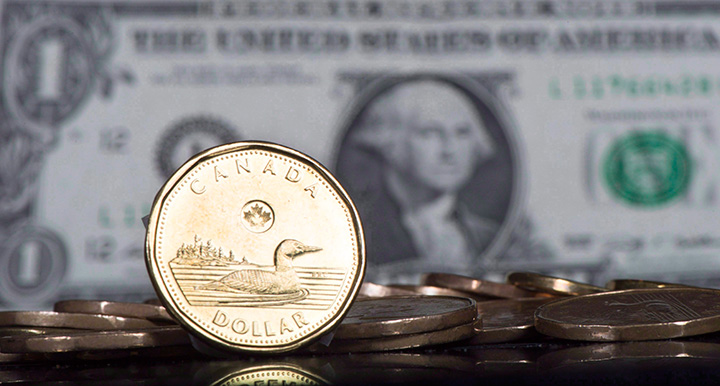The loonie continued to surge Wednesday holding its strongest level in nine months as the Bank of Canada kept the interest rate unchanged, and the result could be good news for consumers.

Canada’s central bank announced it would keep its key interest rate at 0.5 per cent as the economy has showed signs of improvement. The central bank is predicting the country’s real gross domestic product to expand by 1.7 per cent in 2016, up from its January expectation of 1.4 per cent, and 2.3 per cent growth in 2017.
READ MORE: Bank of Canada says economy is growing more than it previously thought
“It does appear that the positive forces at work in the economy are starting to outweigh those that are negative,” the bank said in a statement Wednesday. “First-quarter GDP growth appears to have been unexpectedly strong.”
The Canadian dollar reacted positively to the news, erasing earlier losses, and remained just above 78 cents US, up around eight cents from a January low of 70 cents. The rising dollar has been fuelled by stabilizing oil prices which have hovered around $40 in recent months.
And while Bank of Canada governor Stephen Poloz remained cautiously optimistic in today’s rate announcement, economists say a soaring loonie could take money off your grocery list.
“The big story is as the dollar goes back up, the proverbial cucumbers and blueberries at Loblaws, or the cauliflower is going to be less expensive,” said Ian Lee, professor at the Sprott School of Business at Carleton University.
WATCH: Bank of Canada talks rising food prices

Lee said the price of groceries will come back down from the high prices of the last few months. In January, the low loonie food prices up 4.1 per cent compared to the same month a year ago.
“Food prices are one of a number items in the basket for total inflation that are affected from a pass through from past depreciation of the Canadian dollar,” Carolyn Wilkins, senior deputy governor with the BOC, said Wednesday. She noted weather-related events also contributed to higher costs at the grocery store.
While grocery bills go down, the price of gas could go up
While shopping for fruits and vegetables may be getting cheaper, Canadians will pay for it at the pumps.
“We are going to see the price of gas go back up,” said Lee. “It’s back up around a dollar or so and we are going to keep paying a bit more.”
Benjamin Tal, deputy chief economist with CIBC Capital Markets, said the positive economic outlook is a “mixed bag” for provinces across the country.
READ MORE: 20% of Calgary downtown office space vacant, highest level in over 30 years
“The increase in the dollar is less inflationary, so people will see when they go to the grocery store,” said Tal. “However, the negative is a stronger dollar is less positive for the manufacturing sector, and exporting companies.”
Tal said the Canadian economy is actually a tale of “two economies” as lower oil prices were actually a positive for Ontario, B.C., and Quebec, while devastating for Alberta and the energy sector.
“The damage (from lower gas prices) is deep and narrow,” he said. “The labour market in Alberta is clearly struggling, unemployment is rising, at the same time we are starting to see some positive signs coming from the rest of the country.”









Comments